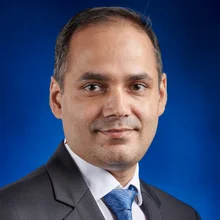
Deal of the year: Deutsche Bank

A commitment to transparency in hedging, risk management and green transactions saw Deutsche Bank win the Deal of the year in the Energy Risk Asia Awards for 2021. The bank conducted a ground-breaking trade, a true industry first: a green hedge backed by a second party opinion (SPO) based on a specially developed green hedge framework. Such a landmark transaction will enable the creation and development of a transparent risk management framework for all types of green financings.

Such deals, says Rahul Jain, Deutsche Bank’s managing director in investment banking in Singapore, are “greatly needed for the long-term success and sustainability of emerging markets issuers, investors and underlying green projects”.
Jain, who serves as Deutsche’s head of sustainability and special situations in Asia, part of the global emerging markets division, says a key part of the bank’s success in winning this year’s award is that it took steps that every banking and financial institution ideally should – “to ensure transparency around green transactions”.
“We appreciate the challenges market participants face in emerging markets. If risks are not hedged properly, it can pose repayment challenges when bonds come due. So, we worked on appropriate hedging strategies along with an SPO provider to bring transparency around what the green bond issuer was doing on the hedging side,” he says.
Hedging is critical for emerging markets participants, and it is in the best interests of investors, issuers and all stakeholders involved that a transparent process for hedging is considered, similar to what currently happens for green financing.
Jain says Deutsche Bank’s hope is to set the stage for broader risk management and for providers to look at the opportunities to be gained in doing risk management in a transparent manner: “If I think back to 2008, when the World Bank issued the first green bond backed by an SPO, it was a market innovation at the time. Since then, trillions of dollars have been invested in such green bonds due to the transparency this process brings.”
It is that transparency that is all the more crucial for emerging market issuers. To that end, all market participants need to recognise hedging for the important consideration it is, and that it comes alongside financing for emerging markets.
To Jain, it is “a total package that can determine the success of the projects and of the green financings backing these projects”.
Indeed, a great way for emerging market issuers to give investors a degree of comfort would be for them to prove they have examined all aspects of their risk – such as liquidity, interest rate and foreign exchange risk. Yet that requires transparency.
Emerging markets, which are now at the forefront of the green revolution – being both the problem and the solution for any meaningful global climate transition – are regularly tapping the green bond market to support green projects in local emerging countries. However, such bond issuances are typically in US dollars or euros, which creates a significant FX risk exposure for both the issuers and investors.
A key concern is that market participants looking at areas of fast, exponential growth – which is currently the case for green investments – can often take on significant risks, to the extent that people forget about the downside. In doing so, they lose sight of the risks and only realise the possibility of a market crash when one occurs, as in 2008, and which could happen again in the future.

“That is why one must look at risk and liquidity management the same way, with an eye towards transparency. Transparency is also needed to avoid the most critical issue the environmental, social and governance (ESG) industry is facing – greenwashing,” says Serene Chen, Deutsche’s managing director and head of risk management solutions in Asia-Pacific (Apac).
Why Deutsche Bank is different
Deutsche Bank’s track record in Asia over the past several years has been one of innovation. This has been highly visible in its green energy and ESG-linked transactions.
“A few years back, we had done large-scale risk management projects in Taiwan and won awards from both Energy Risk and Asia Risk. We also received the Financial innovation award from A Word About Wind in Europe earlier this year for those landmark hedging solutions,” says Jain. “Last year, we did Asia’s first ESG-linked hedge with a Singapore client, which also won awards from Asia Risk.
“This year, we are continuing that trend with a world first: the first-ever green hedging transaction backed by an SPO.”
SPOs are common in green financings, wherein an external agency will look at use of proceeds for underlying projects and provide an opinion as to whether this can be considered green or not. Deutsche Bank has taken this approach for its green hedge as well, and engaged with an SPO provider to review the hedge.
“We innovate, not for the sake of doing something obscure, but innovation with the aim of making things more transparent and scalable,” says Chen.
Deutsche Bank has focused deeply on ESG matters and how it can work with its clients in addressing ESG-related issues through innovative and impactful solutions. Recently, it set up an ESG Centre of Excellence in Singapore, showcasing the bank’s commitment to becoming the premier client-focused ESG bank in Apac by helping drive ESG transition of clients through innovative solutions.
“ESG is a core part of Deutsche Bank’s strategy, and we are well situated to deliver ESG-related solutions to clients, stakeholders and society at large, who demand such solutions,” says Chen.
“The awards and recognition from various industry participants that Deutsche Bank has received over the past several years are testimony to our focus, leadership and innovation in the ESG space, and how Deutsche Bank is working with different clients to drive sustainability efforts in an impactful and prudent manner.”
“To expand and grow the sustainable and green finance sector, innovative and new product offerings are needed. Limiting sustainable products to just financing instruments such as bonds and loans will not further advance ESG practices, and will not expand sustainable finance to its fullest potential in mitigating and promoting climate change and a sustainable future for all. Deutsche Bank is leading the industry by providing innovative risk management solutions, setting the standards for sustainability-linked and green derivatives, and encouraging ESG solutions for the broader economy,” says Jain.
Challenges of the pandemic
The ravages of the 18 months have impacted the financial and corporate sectors, not to mention every person on earth. The challenges notwithstanding, there were also opportunities to be had from the crisis for those poised to capitalise on them.
For Deutsche Bank, the difficulties associated with the Covid-19 pandemic were a challenge. Yet, through it all, the bank navigated the situation well, Jain says – in terms of managing employees, supporting society and serving Deutsche Bank’s clients.
The bank was named Crisis response bank of the year in the Asia Risk Awards 2020. “Clearly, how we handled Covid-19 through our use of technology and agility played an important role in that,” Jain says. “We were quick to respond to the demands of our clients and supported them by transitioning them over to our award-winning emerging markets trading platform, despite most of our and our clients’ employees working from home. Deutsche Bank won this year’s Best emerging markets trading platform in the FX Markets Asia FX Awards.”
Deutsche also actively supported clients across different segments by helping them navigate an unprecedented challenging market environment through the development of innovative bespoke solutions that demonstrated the full strength of its product offering and platform capabilities.
“Again, we helped clients during very adverse market conditions when there were few liquidity providers, especially for long-dated tenors and illiquid risk” says Chen. “We succeeded because we connected with them online and enabled business through our award-winning trading platform. That has enabled us to win the support and trust of our clients and increased our market share.”
Sponsored content
Copyright Infopro Digital Limited. All rights reserved.
As outlined in our terms and conditions, https://www.infopro-digital.com/terms-and-conditions/subscriptions/ (point 2.4), printing is limited to a single copy.
If you would like to purchase additional rights please email info@risk.net
Copyright Infopro Digital Limited. All rights reserved.
You may share this content using our article tools. As outlined in our terms and conditions, https://www.infopro-digital.com/terms-and-conditions/subscriptions/ (clause 2.4), an Authorised User may only make one copy of the materials for their own personal use. You must also comply with the restrictions in clause 2.5.
If you would like to purchase additional rights please email info@risk.net